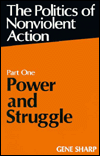|

$7.95,
paper, 105 pages, 1973 |
The
Politics of Nonviolent Action, Gene Sharp
Part 1: Power and Struggle
Table of Contents
PREFACE by Dr. Gene Sharp
INTRODUCTION by Professor Thomas C. Schelling
PART ONE: POWER AND STRUGGLE
Introduction
Chapter One
THE NATURE OF POLITICAL POWER
INTRODUCTION
WHAT IS THE BASIC NATURE OF POLITICAL POWER?
SOCIAL ROOTS OF POLITICAL POWER
A. Sources of power
1. Authority
2. Human resources
3. Skills and knowledge
4. Intangible factors
5. Material resources
6. Sanctions
B. These sources depend on obedience
WHY DO MEN OBEY?
A. The reasons are various and multiple
1. Habit
2. Fear of sanctions
3. Moral obligation
4. Self-interest
5. Psychological identification with the ruler
6. Zones of indifference
7. Absence of self-confidence among subjects
B. Obtaining the ruler's functionaries and agents
C. Obedience is not inevitable
THE ROLE OF CONSENT
A. Obedience is essentially voluntary
B. Consent can be withdrawn
TOWARD A THEORY OF NONVIOLENT CONTROL OF POLITICAL POWER
A. Traditional controls
1. Self-restraint
2. Institutional arrangements
3. Applying superior means of violence
B. Theorists on withdrawal of support
C. Clues to the political impact of non-cooperation
1. Bureaucratic obstruction
The United States
Chart One: Power
The Soviet Union
Germany
2. Popular non-cooperation
India
The Soviet Union
D. Toward a technique of control of political power
NOTES TO CHAPTER ONE
Chapter Two
NONVIOLENT ACTION: AN ACTIVE TECHNIQUE OF STRUGGLE
INTRODUCTION
CHARACTERISTICS OF NONVIOLENT ACTION
A. A special type of action
Chart Two: Action in Conflicts
B. Motives, methods and leverages
C. Correcting misconceptions
D. A neglected type of struggle
ILLUSTRATIONS FROM THE PAST
A. Some early historical examples
B. The pre-Gandhian expansion of nonviolent struggle
C. Early twentieth-century cases
1. Russian Empire - 1905-06
2. Berlin - 1920
3. The Ruhrkampf - 1923
D. Gandhi's contribution
1. Vykom - 1924-25
2. Gandhi's theory of power
3. India - 1930-31
E. Struggles against Nazis
1. Norway - 1942
2. Berlin - 1943
F. Latin American civilian insurrections
1. Guatemala - 1944
G. Rising against Communist regimes
1. Vorkuta - 1953
H. American civil rights struggles
1. Montgomery, Alabama - 1955-56
CONTINUING DEVELOPMENT
A. Czechoslovakia - 1968
SEEKING INSIGHT
NOTES TO CHAPTER TWO
|
»
Part 2
» Part
3
» order
this book |


